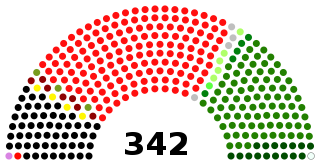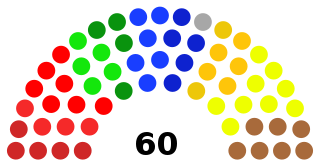
The politics of Zimbabwe takes place in a framework of a full presidential republic, whereby the President is the head of state and government as organized by the 2013 Constitution. Executive power is exercised by the government. Legislative power is vested in both the government and parliament. The status of Zimbabwean politics has been thrown into question by a 2017 coup.
A member of parliament (MP) is the representative of the voters to a parliament. In many countries with bicameral parliaments, this category includes specifically members of the lower house, as upper houses often have a different title. Member of Congress is an equivalent term in other jurisdictions.

The Parliament of South Africa is South Africa's legislature; under the present Constitution of South Africa, the bicameral Parliament comprises a National Assembly and a National Council of Provinces. The current twenty-seventh Parliament was first convened on 22 May 2019.

The Indiana General Assembly is the state legislature, or legislative branch, of the state of Indiana. It is a bicameral legislature that consists of a lower house, the Indiana House of Representatives, and an upper house, the Indiana Senate. The General Assembly meets annually at the Indiana Statehouse in Indianapolis.

The Senate is the upper house of the French Parliament. Indirectly elected by elected officials, it represents territorial collectivities of the Republic and French citizens living abroad. The Senate enjoys less prominence than the lower house, the directly elected National Assembly; debates in the Senate tend to be less tense and generally receive less media coverage.

The National Assembly of the Republic of Korea, often shortened to the National Assembly in domestic English-language media, is the 300-member unicameral national legislature of South Korea. Elections to the National Assembly are held every four years. The latest legislative elections were held on 13 April 2016. Single-member constituencies comprise 253 of the assembly's seats, while the remaining 47 are allocated by proportional representation. Members serve four-year terms.

Senate of Pakistan or Aiwān-e-Bālā Pākistān is the upper legislative chamber of the bicameral legislature of Pakistan, and together with the National Assembly makes up the Parliament.

The National Assembly is the lower house of the bicameral Majlis-e-Shura, which also comprises the Senate of Pakistan. The National Assembly and the Senate both convene at Parliament House in Islamabad. The National Assembly is a democratically elected body consisting of a total of 336 members, before 25th amendment they used to be 342' who are referred to as Members of the National Assembly (MNAs), of which 272 are directly elected members and 70 reserved seats for women and religious minorities. A political party must secure 137 seats to obtain and preserve a majority.

The Parliament of Pakistan is the federal and supreme legislative body of Pakistan. It is a bicameral federal legislature that consists of the Senate as the upper house and the National Assembly as the lower house. According to the constitution of the Islamic Republic of Pakistan, the President of Pakistan is also a component of the Parliament. The National Assembly is elected for a five-year term on the basis of adult franchise and one-man one-vote. The tenure of a Member of the National Assembly is for the duration of the house, or sooner, in case the Member dies or resigns. The tenure of the National Assembly also comes to an end if dissolved on the advice of the Prime Minister or by the president in his discretion under the Constitution.

The Senate is one of the two chambers of the bicameral Federal Parliament of Belgium, the other being the Chamber of Representatives. It is considered to be the "upper house" of the Federal Parliament. Created in 1831 as a chamber fully equal to the Chamber of Representatives, it has undergone several reforms in the past, most notably in 1993 and the reform of 2014 following the sixth Belgian state reform. The 2014 elections were the first ones without a direct election of senators. Instead, the new Senate is completely composed of members of community and regional parliaments and co-opted members. It is a chamber of the communities and regions and serves as a platform for discussion and reflection about matters between the different language communities. The Senate now only plays a very minor role in the federal legislative process. Since the reform, it only holds about ten plenary sessions a year.

The Maryland Senate, sometimes referred to as the Maryland State Senate, is the upper house of the General Assembly, the state legislature of the U.S. state of Maryland. Composed of 47 senators elected from an equal number of constituent single-member districts, the Senate is responsible, along with the Maryland House of Delegates, for passage of laws in Maryland, and for confirming executive appointments made by the Governor of Maryland.

The Parliament of New South Wales is a bicameral legislature in the Australian state of New South Wales (NSW), consisting of the New South Wales Legislative Assembly, and the New South Wales Legislative Council. Each house is directly elected by the people of New South Wales at elections held approximately every four years. The Parliament derives its authority from the Queen of Australia, Her Majesty Queen Elizabeth II, represented by the Governor of New South Wales, who chairs the Executive Council of New South Wales. The parliament shares law making powers with the Australian Federal Parliament. The New South Wales Parliament follows the Westminster parliamentary traditions of dress, Green–Red chamber colours and protocol.
The Senate was the upper house of the Parliament of South Africa between 1910 and its abolition from 1 January 1981, and between 1994 and 1997.

The National Assembly is the upper house of the bicameral Federal Parliament of Nepal, the lower house being the House of Representatives. The composition and powers of the Assembly are established by Part 8 and 9 of the Constitution of Nepal. There are a total of 59 members: 8 members are elected from each of the seven states by an electoral college of each state, and three are appointed by the President on recommendation of the government.

The Senate of Zimbabwe is the upper of the two chambers in Zimbabwe's Parliament. It existed from independence in 1980 until 1989, and was re-introduced in November 2005. The other chamber of Parliament is the House of Assembly

The Haitian Parliament is the bicameral legislature of the Republic of Haiti, consisting of the upper house as the Senate (Sénat) and the lower house as the Chamber of Deputies. Both assemblies conduct legislative sessions at the Haitian capital of Port-au-Prince.

The current Constitution of Malta was adopted as a legal order on 21 September 1964, and is the self-declared supreme law of the land. Therefore, any law or action in violation of the Constitution is null and void. Being a rigid constitution, it has a three-tier entrenchment basis in order for any amendments to take place.

The National Assembly of Thailand is the bicameral legislative branch of the government of Thailand. It convenes in the Sappaya-Sapasathan, Dusit District, Bangkok.















